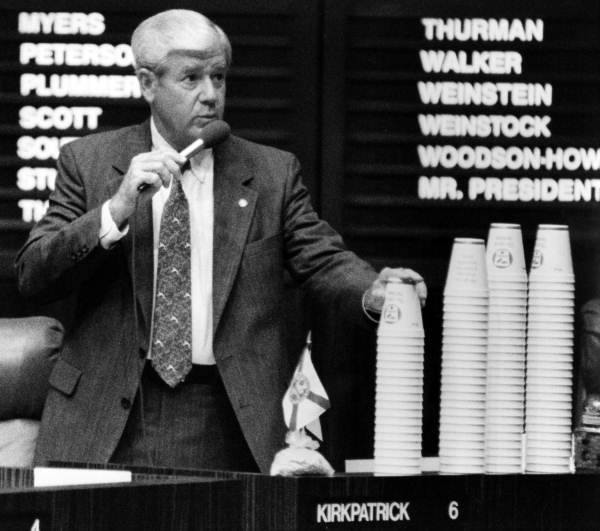Strengthening Democracy Over Coffee: A Powerful Way to Build a Better Future

One cold autumn evening, I was in bed reading a book by Bishop Michael Curry when I came across a saying so useful, I got up in my PJs to jot it down in a journal.
“What are you going to do with your dash?” the old saying goes. The dash here is the line between your birth date and your death date.
There’re two numbers that haven’t gotten much attention since Tuesday’s election: 17,912 and 74%.
There were 17,912 uncontested races on the ballot across the country; that’s 74% of races. In my own town, we had nine local races - school board, water district, election wardens, city council. Every last one of them was uncontested or didn’t have a candidate.
Contested races are one sign of a healthy democracy; 74% of races going uncontested suggests we’ve got an ailing patient.
And how wonderful that we can each do something about that!
So here’s a grand way to spend some of our dash: Find a few folks who might want to run for local office in 2026 - and this could include you!
Many politicians decide to run for office because someone told them over coffee, "You’d be great for town council!”
Just think of all the good people who don’t run because it didn’t occur to them or nobody tapped them on the shoulder to say, “You’d be terrific for this seat!” I’d add that folks who don’t think of themselves as politicians are often folks who can make great politicians.
You - yes, you! - could be the shoulder tapper, the person who helps someone to see themselves as a candidate.
Now if you think, “Who am I to decide who should run for office? I don’t know anything about how this works."
I’d say, “Who are you not to? You live in this town. You’re impacted by votes elected officials take. You have real skin in the game on who’s sitting in those seats."
Here’s a way to kick this mighty useful work off in 5 steps:
Step 1: Find out what seats are up in your next election
There are oodles of tools to do this. But because local elections vary so widely across the country and can be unwieldy to track, the most reliable path is to contact your town clerk - who administers elections - and ask them three things:
- When the next election is
- What races are on the ballot
- When candidates need to file papers to run
Step 2: Gather around the kitchen table
I love nothing more than getting a few good folks together at the kitchen table with some tasty snacks - as Julia Childs said, “A party without cake is just a meeting” - and making a list of people to approach about running.
Many a fine race gets started around those tables. (And potential candidates could be sitting at the table!)
Step 3: Schedule in-person meetings with the names on the list
Meet them for a coffee or a walk in the park. Whatever form it takes, it’s just a bit lovelier to meet in the flesh than over the phone or screen.
Step 4: Ask like a champion
Option 1: “The prom’s coming up. I need a date. Why not you?"
Option 2: “The prom’s on May 22. I love spending time with you. You’re whip smart, fun to be with, and burn up the dance floor. Would you go with me?”
For most of us, option 2 is the winning approach. It’s personalized. The person isn’t just a warm body to fill an empty seat. They are needed because who they are is what the moment calls for.
Here’s an approach I like:
“There’s an open school board seat and you’d be great. You bring patience, curiosity, and non-judgment to the table. We need more folks like you in public service; I know you’d do right by our community's students. And I’ll help with your campaign.”
In other words, you’d be great for these reasons and you wouldn’t be alone. We’ll help get signatures, make yard signs, knock doors, etc.
We’ve just lowered the barrier to participation, especially for the often hardest to attract candidates: folks who are younger, have kids, work full time.
Pressuring, guilting, strong-arming folks just isn’t a great way to invite people into public service. But speaking to their sense of greatness can be. It’s the kind of pitch that could get someone really thinking about running.
Step 5: Take no for answer
Running for office is no small decision. Most of these local positions are light on pay (sometimes so light, there isn’t any) and heavy on time. The best candidates and campaigns are powered by HECK YEAH energy not drudgery, resentment, and low investment. It’s good to give folks time to think about it.
But here’s the other thing: some interesting data shows that giving people permission to say no to something can set the table for them to say yes. We’ve taken the vice grip of pressure off them. We want them to run because they want to run.
If someone says no, we can warmly thank them for considering and move on to the next person on our list. If they say yes, we are off to the races!
With some 18,000 races uncontested, we can’t do this recruitment work alone. So it would be just super to forward this note to 1-2 friends you know are looking to make a difference and invite them into this great work of building a better democracy.
Which is a heckuva a way to spend our dash.
